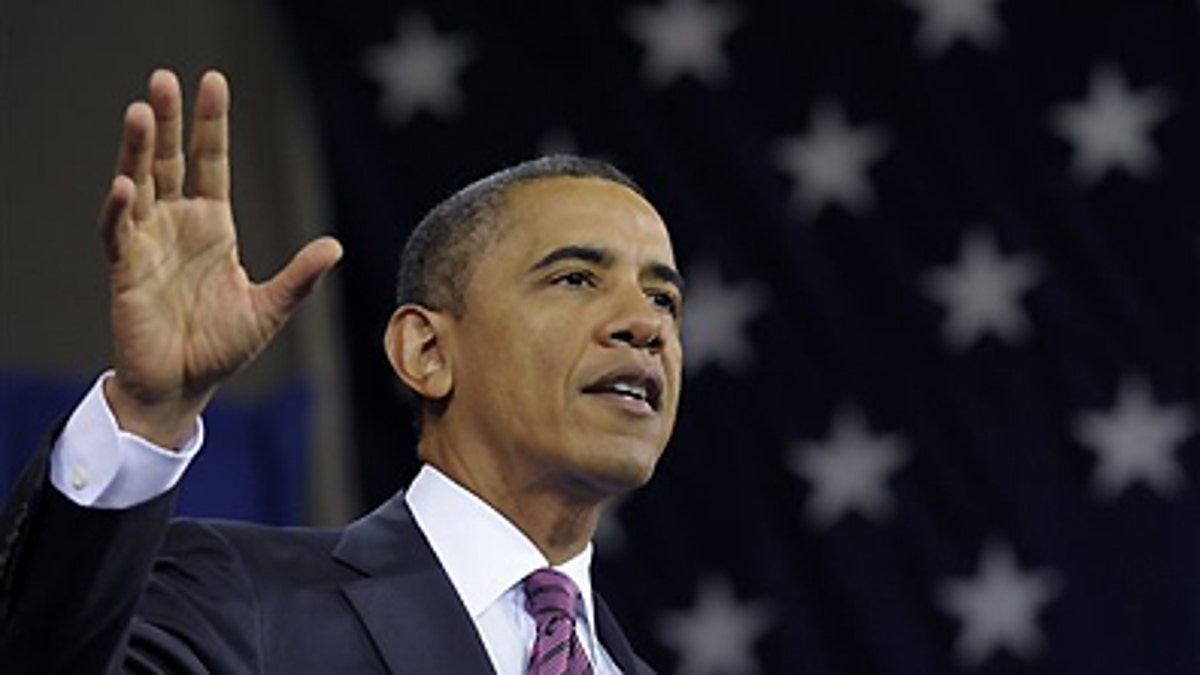
Feb. 1, 2012: President Barack Obama speaks in Falls Church, Va. (AP)
Democrats rejoiced Friday when it was revealed that America's unemployment rate fell to 8.3 percent and 247,000 new jobs were added in January. To them, this was confirmation that President Obama will take them to victory in November.
Whoa! Prospects for more improvement are not great, and President Obama was smart to greet the jobs report with caution.
Let's be fair. He inherited a mess. Unemployment jumped from 6.8 to 10 percent from his election day to October 2009. Since, most of the progress has been statistical, not real.
Jobs creation has barely kept up with population growth—the same percentage of adults is employed today as when unemployment peaked. Three-quarters of the reduction in joblessness is attributable to fewer adults employed or seeking work.
The most effective Obama jobs program has been to convince more Americans they don’t want a job—without that, the unemployment rate would still be at least 9.5 percent.
Many of the jobs created in recent months don’t pay well, and too many well educated Americans are relegated to low skilled and part-time work for lack of opportunities. Gains are concentrated in areas such as restaurants, health care and education, and business services categories—lots of waiters, and more nurse’s aids than nurses, record keepers than teachers, and clerical workers than architects and lawyers.
Manufacturing, a bright spot, historically pays quite well; however, many of the new jobs created don’t pay terribly high wages.
These last several months, stronger jobs reflected stronger fourth quarter GDP growth. Economists see that as a spike rather than a trend. Recent reports indicate slower consumer spending, and gasoline prices rising to levels that will choke off any rebound. Existing home prices continue to plummet, and alarming numbers of home purchase contracts have been canceled.
An economy growing at two percent a year, as economists expect, simply won’t generate enough jobs to pull down unemployment any further, and arrest downward pressure on wages.
Mr. Obama has two advantages over recent incumbents.
His predecessor is widely acknowledged to have failed in his stewardship of the economy. Mr. Obama, unlike Jimmy Carter and George H. W. Bush, who lost reelection bids, won’t be running against a premier communicator like Ronald Reagan or Bill Clinton.
Mr. Obama has convinced too many Americans to accept slow growth and stagnant incomes are the best they can expect if they wish to avoid financial instability and another crisis.
For the record, as Ronald Reagan campaigned for reelection, his revamped, post Carter-malaise economy had rocked along at 7.5 percent for six quarters—not the tepid 2 percent that Democrats preach is the new normal. Old Dutch believed in American Exceptionalism—not leading from the rear.
Mitt Romney, the presumptive Republican nominee, has much of the problem scoped—leveling the playing field for U.S. businesses and workers competing with China, producing more and importing less oil, addressing dysfunctions on Wall Street, and curbing skyrocketing health care costs. All issues Mr. Obama admits but either has not addressed or made worse.
Yet, primary voters gravitate to Mr. Romney, not because they are persuaded he can beat Mr. Obama, but rather because he is a more plausible candidate than his baggage laden and eccentric rivals.
He spends too much time trying to convince voters of the inconceivable—pink slipping workers at Bain Capital makes him an experienced jobs creator and he cares about the poor when he says he worries not about them; responding to critics that say he is not conservative enough; and slinging mud of his own.
Mr. Romney’s overwhelming victories in Florida and Nevada offer him a period of grace before the next significant cluster of primaries and caucuses that bind delegates—from February 28 to March 6, twelve states will so vote.
He should use this period to explain to Americans why creating enough decent paying jobs requires fixing trade with China, revving up domestic oil production, and fixing problems in financial regulation and health care—how he’s going to get those things done.
Merely offering tax cuts and less regulation—like Republicans of yore—won’t cut it. George W. Bush nearly wrecked the country for good ignoring the very same issues Mr. Obama is now mismanaging.
Mr. Romney must offer Americans something more, or they won’t make a change.
Peter Morici is a professor at the Smith School of Business, University of Maryland and former chief economist at the U.S. International Trade Commission. Follow him on Twitter@pmorici1.
